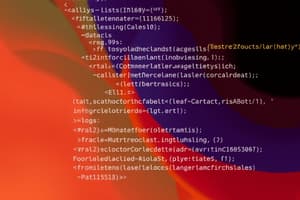Podcast
Questions and Answers
What role do data types play in R programming?
What role do data types play in R programming?
- Data types define the order of conditional statements in a program
- Data types categorize different forms of data for manipulation (correct)
- Data types indicate the number of loops needed for a computation
- Data types determine the output format of variables in R
Which of the following is NOT a common data type in R?
Which of the following is NOT a common data type in R?
- Binary (correct)
- Floating point
- Raw
- Logical
How do variables contribute to the functionality of R programming?
How do variables contribute to the functionality of R programming?
- Variables define the return type of R functions
- Variables determine the flow of conditional statements in R scripts
- Variables directly control the number of loops executed in R functions
- Variables store values that can be referenced and manipulated in a program (correct)
In R programming, what are functions primarily used for?
In R programming, what are functions primarily used for?
Which structure is commonly used to execute a set of statements repeatedly based on a condition in R?
Which structure is commonly used to execute a set of statements repeatedly based on a condition in R?
Flashcards are hidden until you start studying
Study Notes
Introduction
R programming is a popular open-source language for statistical computing and graphical analysis. It provides various data types and control structures to handle complex computations and manipulations of data. In this article, we will delve into the fundamentals of R programming by discussing its basic concepts such as data types, conditional statements, loops, variables, and functions.
Data Types
Data types help categorize different forms of data that can be stored and operated on in a computer language like R. Some common data types in R include character, integer, double precision floating point, logical, raw data type, and complex numbers. For example:
## Character data type
char <- "Geeksforgeeks"
print(class(char)) # Output: character
## Integer data type
int <- 1
print(class(int)) # Output: integer
## Double precision floating point data type
double <- 3.14
print(class(double)) # Output: double
## Raw data type
raw_data <- as.raw(c(0x1, 0x2, 0x3, 0x4, 0x5))
print(class(raw_data)) # Output: raw
Conditional Statements
Conditional statements allow you to execute specific pieces of code based on certain conditions. R offers two types of conditional statements: if() and ifelse(). The if() statement checks if a condition is true or false, while ifelse() returns one value when a condition is true and another value when the condition is false. Here's an example using both:
## Using if()
condition <- TRUE
if (condition) {
print("The condition is true.")
} else {
print("The condition is false.")
}
## Using ifelse()
result <- ifelse(condition, value_if_true, value_if_false)
print(result)
Loops
Loops are used to repeatedly perform a series of operations until a specified condition is met. R supports three types of loops: for, while, and repeat. Here's how they work:
For loop
for (i in sequence) {
# Code block to be executed
}
While loop
while (condition) {
# Code block to be executed
}
Repeat loop
repeat {
# Code block to be executed
break if (some_condition)
}
Variables
Variables in R are named objects where values are assigned and accessed. They have unique names and can store any valid data type. You can assign and access the value of a variable using the assignment operator <-.
variable <- value
print(variable)
Functions
Functions are reusable blocks of code in R that perform a specific task. You can create your own custom function by defining the input parameters and returning a result. Here's an example of how to define and call a simple function called my_function():
my_function <- function(x, y = 1) {
return(x + y)
}
result <- my_function(2, 3)
print(result)
By understanding these concepts, you can develop more efficient and powerful R programs for data manipulation and analysis tasks.
Studying That Suits You
Use AI to generate personalized quizzes and flashcards to suit your learning preferences.




